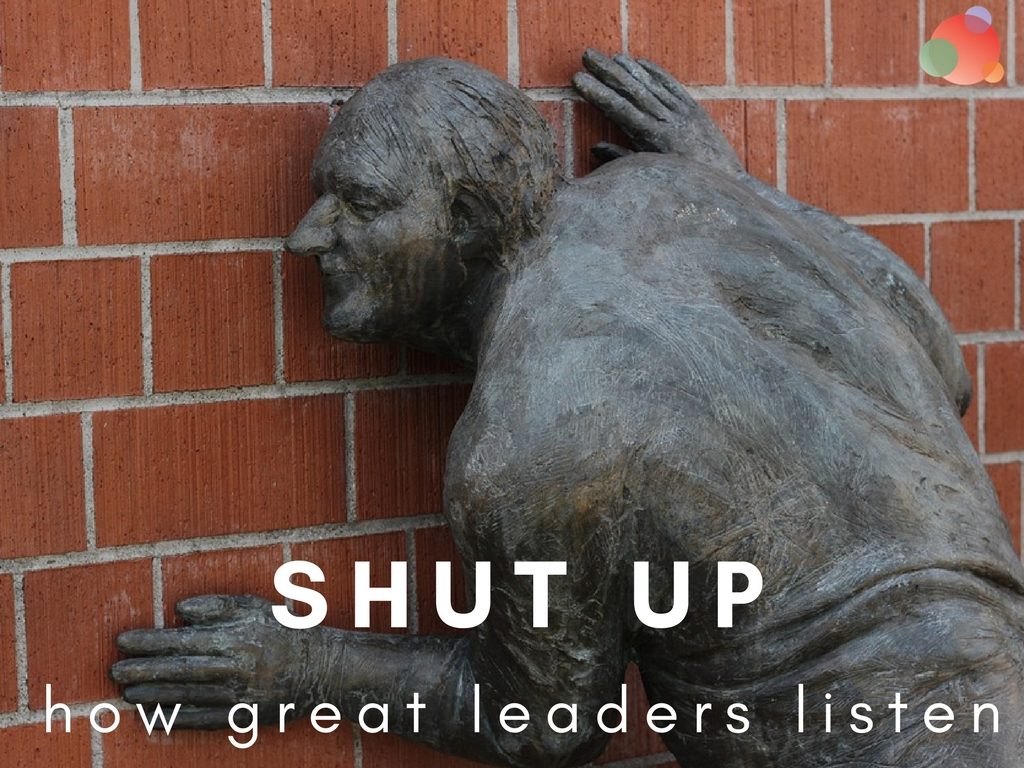 Yesterday, Laura Petrolino wrote an article about active listening and how important it is for communicators to do.
Yesterday, Laura Petrolino wrote an article about active listening and how important it is for communicators to do.
In it, she describes active listening versus hearing—and then provides several questions to ask yourself to determine whether or not you’re a good listener.
She says:
My very non-scientific suggestion for a quick and easy self-assessment is to ask yourself this one question:
Do people tell you personal and private things about them without being prompted or encouraged?
- Do you go to the grocery store and get caught with the cashier telling you a story about how her boyfriend cheated on her or his dog is sick?
- Have you ever been in a business meeting and have the other person suddenly divert and start to tell you information with a level of intimacy beyond the context of the relationship at that time?
- Do you have people spill out their guts to you and then suddenly stop and say, “I’m not sure why I told you all of that”?
If you do, you are probably a good listener.
If you’re like my mom, people tell you stuff they probably shouldn’t tell you—even though they just met you.
That makes you a great listener.
Bill Clinton is a Master Listener
But it’s not just an important skill for communicators.
I’d say it’s an important skill for all human beings—particularly leaders.
After all, we need to have conversations, not dictatorships, with the people on our teams.
Great leaders listen—and they do so more than talking.
There is no other way to great consensus, which is very, very difficult to do.
You can’t just talk. You have to listen.
Some of the world’s very best leaders are incredible listeners.
Bill Clinton, no matter how you feel about his politics, is a master at this.
Next time you see him interviewed, pay attention to how he listens.
You’ll notice he listens very intently, his eyes on the interviewer.
When the question is asked, he pauses, thinks for a moment, and then answers.
Though he likely knows what he’s going to be asked before the question is even out of the interviewer’s mouth, and you know he already knows how he’s going to answer, he never interrupts the interviewer or finishes the question before answering.
It’s an incredibly important skill that few of us have mastered.
Do We Know How to Listen?
Now look around at the people you work with every day.
Sit back in a staff meeting and watch.
- How many times do they interrupt one another?
- Do they let one another finish before speaking?
- Do they jump in and out of conversations with no respect for the other people at the table?
This happens with your friends, too.
I know my friends do it.
We get excited or passionate about a topic and all begin to talk on top of one another.
No one actually listens…but we all want to talk.
It’s infuriating for me, particularly because I’m an introvert so it’s hard for me to talk over people, especially at a rowdy table of friends.
What Do You Think?
I met Randy Hall about 10 years ago.
I’ve worked with him a few times in my quest for world domination, and the past couple of years, he’s worked with some of my executive team.
He is our Phil Jackson.
The first time I worked with him, I was a “leadership” mess and he pushed me really hard.
(I put leadership in quotes because I’m not sure I could even spell it back then—let alone demonstrate it.)
In one of our very first coaching sessions, I had an HR issue I needed help working through.
I presented it to him and waited, wide-eyed and bushy-tailed, for him to tell me what to do.
He said,
What do you think?
I remember thinking,
Well Randy, if I knew what to think, I wouldn’t be asking you!
So I stumbled my way through an answer.
He said,
And why is that the way you’d handle it?
Shoot, Randy. I don’t know! I’ve never done this before.
Great Leaders Listen
But what he did was not only force me to think through the issue before presenting it to him, he made me think about the best way to handle it…without telling me what to do.
Sure, he’d guide me, but he’d never give me the answer.
This is a habit I picked up from him.
My team and my mastermind clients will tell you I do this to them all the time—and now Laura does it, too (which makes me gleeful).
It’s super frustrating.
I know it is because I’ve been there.
But rather than give them the answers, I’m listening to the problem and I’m empowering them to provide solutions and make decisions.
It’s not easy on this side, either.
Most of the time I’m presented with a challenge I know how to fix.
It would be a lot easier and a lot less time-intense if I just said,
This is how you fix it. Now be on your way.
But a leader that does not make. A scalable business that does not make. An empowered team that does not make. And a great listener that does not make.
The next time you’re presented with a challenge, I encourage you to listen.
Really listen.
And then ask the other person,
What do you think?
I’ll be curious to hear what happens.